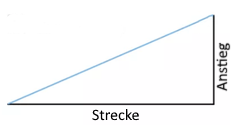Calculate Slope
Online calculator for calculating slopes from rise and horizontal distance
Slope Calculator
Slope from Rise and Run
Calculates the slope of a line from the vertical rise and the horizontal run as angle and percentage.
Visualization

The graphic shows the slope triangle with rise (vertical) and run (horizontal).
The slope is the ratio of rise to horizontal distance.
What is a Slope?
The slope describes how steeply a line or surface rises:
- Ratio: Rise divided by horizontal distance
- Units: Percent (%) or angle (°)
- Application: Roads, roofs, ramps
- Positive values: Rise upward
- Negative values: Decline downward
- Zero: Horizontal surface
Slope in Percent
The percentage is the most common form of slope specification:
Formula
Ratio multiplied by 100
Examples
- 10%: 10 m rise over 100 m
- 5%: Typical road gradient
- 100%: 45° angle
Slope Angle
The slope angle is the geometric representation of the slope:
Angle Formula
Arctangent of the ratio
Angle Ranges
- 0°: Horizontal
- 45°: 100% slope
- 90°: Vertical
Formulas for Slope Calculation
Basic Formula - Slope as Ratio
Ratio of vertical rise to horizontal distance
Slope in Percent
Slope as percentage
Slope Angle
Slope as angle in degrees
Convert Percent to Angle
From percent to degrees
Convert Angle to Percent
From degrees to percent
Example
Example Calculation
Slope in Percent
The slope is 7.5%
Slope Angle
The slope angle is approximately 4.29°
Interpretation
- 7.5%: Moderate slope
- 4.29°: Gentle rise
- Assessment: Suitable for roads and paths
Practical Values
- 2-4%: Sidewalk
- 5-8%: Normal road
- 10-15%: Steep road
Understanding Slope in Practice
The slope is a fundamental concept in engineering, construction, and geography. It describes how steeply a surface, road, or line is inclined relative to the horizontal. The calculation is done via the ratio of vertical rise to horizontal distance.
Definition and Calculation
The slope is given as a dimensionless number or as a percentage:
Here, the rise is the vertical height difference and the run is the horizontal distance between two points.
Forms of Representation
Percentage
The most common form in construction and road building. 100% corresponds to a 45° angle.
Decimal Number
In mathematics often represented as a decimal fraction (e.g., 0.075 for 7.5%).
Angle Specification
In degrees (°) for geometric calculations and technical drawings.
Ratio
As a fraction (e.g., 1:8) particularly common in architecture.
Practical Applications
Slope calculations are found in many areas of daily life:
- Road construction: Planning road gradients, highway ramps
- Architecture: Roof slopes, stair gradients, accessibility ramps
- Landscaping: Garden design, drainage, terracing
- Mechanical engineering: Conveyor systems, slides, conveyor belts
- Surveying: Terrain surveying, contour lines on maps
- Sports: Ski slopes, cycling routes, running tracks
Typical Slope Values
Sidewalks
2-4% (1.1-2.3°)
Comfortable slope
Normal Roads
5-8% (2.9-4.6°)
Typical traffic roads
Steep Roads
10-15% (5.7-8.5°)
Mountain roads, warning signs
Safety Aspects
When planning slopes, various safety aspects must be considered:
- Vehicles: Braking distance and acceleration capability
- Pedestrians: Comfort and slip hazard
- Wheelchair users: Maximum 6% for independent use
- Drainage: Minimum gradient of 0.5% for water runoff
Mathematical Relationship
Slope calculation is based on trigonometry. The tangent of the slope angle corresponds to the slope as a decimal number. This enables conversion between percentage, angle, and ratio specifications.
|
|